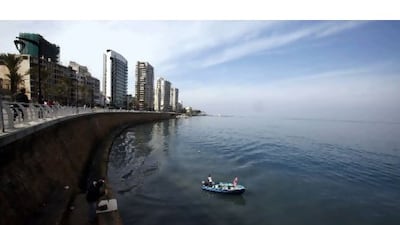Lebanon's newly-appointed prime minister Najib Mikati has asked for a clarification after Greek energy firm Energean awarded a drilling contract for offshore work in an Israeli block that borders territorial waters disputed by both countries.
The two countries contest rights to explore for hydrocarbons in the Eastern Mediterranean, which, in recent years, has yielded some significant gas discoveries.
"We will not back down on this issue or give up on Lebanese rights," Mr Mikati said in a statement.
On Saturday, Energean awarded US energy services company Halliburton contract for drilling three to five wells in the Karish North gas field, located near Israel's disputed maritime border with Lebanon.
The offshore block is estimated to hold up to 1.14 trillion cubic feet of gas.
"We are excited to build on our strong relationship with Energean and honored to once again be selected to deliver integrated project management services that maximise the value of their offshore Mediterranean wells,” said Ahmed Kenawi, senior vice president of Europe, Eurasia and Sub-Saharan Africa at Halliburton.
The company did not respond to the statement from the Lebanese prime minister's office.
Energy-deficit Lebanon has previously unsuccessfully launched licensing rounds to explore for offshore oil and gas, in order to meet its growing demand for fuel.
However, political instability, a lack of effective government for prolonged periods, as well as poor credit ratings have scuppered the country's plans to become a regional producer.
In October, there were signs that Israel and Lebanon could possibly reach detent over their disputed offshore exploration blocks. However, little progress has been made between the hostile nations to reach a settlement.
Lebanon and Israel lay claim to 800 square kilometres of territorial waters that are expected to contain significant gas reserves.
While the latest estimates on the potential for Lebanese gas discoveries remain unclear, earlier data offered by the government has suggested that the territorial waters could contain as much as 100 trillion cubic feet of natural gas and 865 million barrels of oil.
Previous Lebanese attempts to explore for oil and gas have also been derailed by Israel, which has threatened arbitration if Beirut drilled close to its own blocks.
Lebanon awarded offshore Blocks 4 and 9 during its first licensing round to a consortium led by Total, Russia’s Novatek and Italy’s Eni.
Early exploration attempts proved unsuccessful, with Lebanese officials left fuming after Israel announced plans to drill close to Block 9 in 2020.
Energean, which is listed on the London Stock Exchange, has previously considered buying a 45 per cent stake in the Gaza Marine offshore gas block.
The field, which was discovered in 2000, falls under the jurisdiction of the Palestinian National Authority, which governs the West Bank. The discovery of the field, which is estimated to hold up to a trillion cubic feet of gas had led to hopes of peace via a possible gas-sharing agreement between Israel, Palestine, and Egypt, which lies south of the block.
However, its development remains stalled due to political differences between the Palestinian Authority and Israel.


